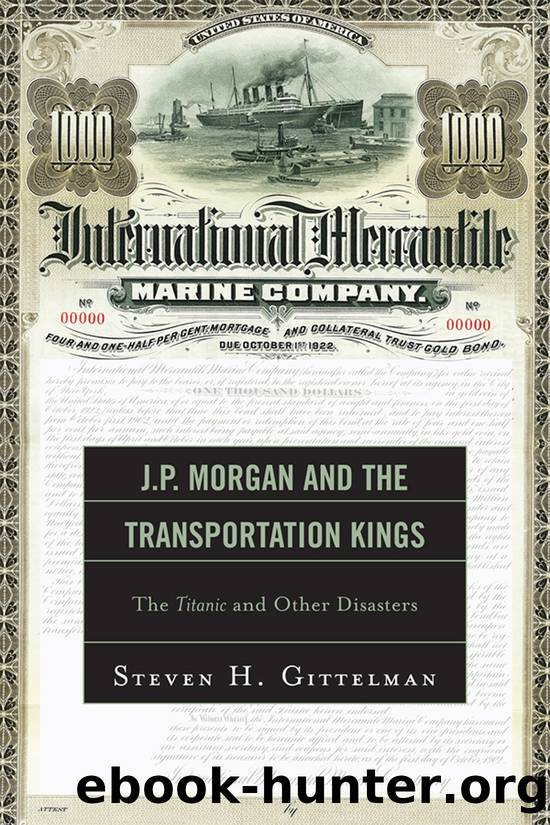J.P. Morgan and the Transportation Kings by Steven H. Gittelman

Author:Steven H. Gittelman
Language: eng
Format: epub
ISBN: 9780761858515
Publisher: UPA
Chapter Twenty-one
Hannaâs Last Hurrah
The vulnerability of the IMM was not immediately apparent and there was good reason to hope that it would overcome some of the obstacles that lay in its wake. The market decline, for instance, was something that could reasonably be expected to reverse. One issue that could not be anticipated was the death of one of Morganâs most important political alliesâMark Hanna.
Hannaâs efforts to influence Roosevelt after the death of McKinley may have been subtle, but his role in government as a potential buffer between Morgan and Roosevelt, and as a keen supporter of business interests in general, was crucial to the success of Morganâs broader plan to consolidate shipping in the North Atlantic.
As the 1904 presidential campaign season approached, Mark Hannaâs tolerance of Roosevelt expired. If he considered Roosevelt a madman before, the conflict over the Northern Securities Company and Rooseveltâs other understated efforts to oppose both Hanna and businessmen like Morgan made him seem positively tyrannical. Hannaâs feelings about Roosevelt were not the only motivating factor that inspired him to have the presidency in his sights. His efforts to convince Roosevelt to preserve the principles of Commonwealthâprinciples that Hanna and his political allies had worked to make the ideological focus of the Republican Partyâwere unsuccessful and it was increasingly clear that Roosevelt was pushing for major reform.1
Hanna had a business incentive, too. With interests in the steel and iron industries, he could easily reckon the benefit of Morganâs broader scheme, the creation of an international transportation network, supported by American ships and managed by Americaâs moneyed men. During the final three years of his life, Hanna worked to preserve the Commonwealth policies of development and protection he had championed throughout so much of his political career.2
In the fall of 1901, Hanna climbed high in public estimation. He was the undisputed leader of the Republican Party and more popular throughout the country than he had ever been before.3 Committed as he was to special business interests and to âmachineâ politics, his unprecedented popularity and his intra-party dispute with Roosevelt drove him to consider seriously his potential as a presidential candidate.4 As he weighed up his activities, it must have been increasingly clear that, with his legislative interests greatly increased in scope, and his increased involvement in national political issues, a presidential bid was quite reasonable. It was also an effective means of squashing Roosevelt and preventing the future attacks on what Hanna considered to be interests fundamental to Americaâs continued development.5
Roosevelt was an unpredictable factor in the build-up to the 1904 elections, and he had been widely regarded as a possible candidate for 1904 at the time of McKinleyâs reelection.6 As the president-in-office, he had to be considered a possible nominee as well. His promotion had made him even more a candidate and as vice-president, he had still been considered. Then there was the precedent that, having served only one term, if he wanted re-nomination, there was a presumption in his favor. It was a matter both of personal justice as well as practical consideration.
Download
This site does not store any files on its server. We only index and link to content provided by other sites. Please contact the content providers to delete copyright contents if any and email us, we'll remove relevant links or contents immediately.
| Automotive | Engineering |
| Transportation |
Whiskies Galore by Ian Buxton(40332)
Introduction to Aircraft Design (Cambridge Aerospace Series) by John P. Fielding(32338)
Small Unmanned Fixed-wing Aircraft Design by Andrew J. Keane Andras Sobester James P. Scanlan & András Sóbester & James P. Scanlan(32141)
Craft Beer for the Homebrewer by Michael Agnew(17446)
Turbulence by E. J. Noyes(7039)
The Complete Stick Figure Physics Tutorials by Allen Sarah(6638)
Kaplan MCAT General Chemistry Review by Kaplan(6054)
The Thirst by Nesbo Jo(5785)
Bad Blood by John Carreyrou(5769)
Learning SQL by Alan Beaulieu(5412)
Weapons of Math Destruction by Cathy O'Neil(5037)
Man-made Catastrophes and Risk Information Concealment by Dmitry Chernov & Didier Sornette(4736)
iGen by Jean M. Twenge(4702)
Digital Minimalism by Cal Newport;(4542)
Life 3.0: Being Human in the Age of Artificial Intelligence by Tegmark Max(4507)
Audition by Ryu Murakami(4099)
1,001 ASVAB Practice Questions For Dummies by Powers Rod(4038)
Electronic Devices & Circuits by Jacob Millman & Christos C. Halkias(4027)
Pale Blue Dot by Carl Sagan(4001)
